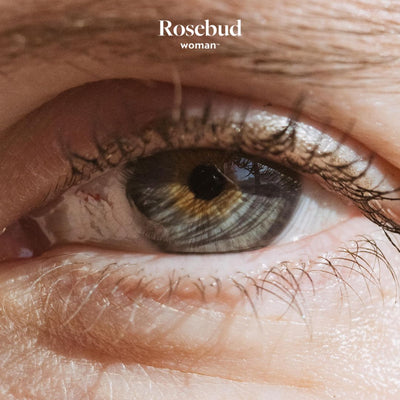What to Tell Your Daughters and Sons About Menopause: Changing the Change
Hey Kids,
I want you to know that menopause is a natural and inevitable phase in a woman's life, and to have understanding, empathy, and respect for it as a natural process. It can be a significant milestone for women. There might be mood swings, physical symptoms, and changes in how I look or feel or how your aunties, teachers, and coworkers look or feel, so I will tell you more about it.
As a refresher, you remember how ovaries work from your sex ed class, right?
Most females have about 1 to 3 million oocytes at birth or baby/immature eggs. These oocytes are resting, waiting for their turn to mature. When girls have their first menstrual period, they have an average of about 400,000 eggs. By menopause, a woman may have fewer than 10,000 eggs. When a young woman begins her period until menopause, under the influence of hormones, every month, a group of oocytes starts to grow inside tiny fluid-filled sacs called follicles. Think of these follicles as little "nurseries" where the oocytes grow. As days pass, one follicle (sometimes more) usually becomes dominant. This means it grows larger and faster than the others. The oocyte inside this dominant follicle is the one that gets the chance to mature fully that month. Inside the dominant follicle, the oocyte undergoes a series of changes. It grows in size and completes a crucial step in cell division, ensuring it has the correct number of chromosomes to combine with a sperm.
Once the oocyte is mature, a luteinizing hormone (LH) surge triggers the dominant follicle to release the mature egg. This event is called ovulation. Now, the mature egg is ready to be fertilized by a sperm. If the egg is fertilized, it can implant in the uterus and develop into an embryo. If it's not fertilized within about 24 hours, it will degenerate and be reabsorbed by the body. In essence, the transformation of an oocyte into a mature egg is a complex dance of growth and cellular changes, all orchestrated by the body's hormones. This process ensures that every month, there's a mature egg ready for the possibility of fertilization and the creation of new life until the eggs begin to diminish- which is the beginning of menopause.
I can make it simpler, sure.
Imagine our bodies are like a giant clock. For women, a particular part of this clock helps them have babies. This part uses a kind of "battery" called eggs. When women are young, the clock ticks every month, using up one egg each time, which causes periods. As time goes on, the number of eggs starts to get low. When very few eggs are left, the clock changes its ticking pattern. This change is called menopause. It means monthly periods stop, and having babies is no longer possible. During this change, because the clock is adjusting, women might feel warmer suddenly or have different moods. It's just the body's way of getting used to the new rhythm. And just like growing taller or gaining a deeper voice, it's a natural part of growing older for women.
Once the clock has finished adjusting to its new rhythm, menopause, it settles into a steady pace. This means the monthly periods have stopped for good, and the clock doesn't use those "egg batteries" anymore. With the clock's new pace, the body feels more consistent. The sudden warm feelings or mood changes become less frequent. But, like any clock ticking for a while, there might be some other changes over time. For example, bones might not be as strong as before, or the heart might need more care.
When does it happen?
For most women, this happens in their early 50s, but it can start in the early 40s or be as late as the early 60s. It can take up to 8 years for some women, and for some, it's over in a few months. It varies. Ask the women you care about what their personal experience is. All women who live long enough go through this. It can happen earlier if certain medications are used to suppress hormones or if the ovaries are removed surgically for any reason.
Do men go through something similar?
Yes, men also go through a change in hormones in their 50s- this is known as andropause.
Here are five things I want you to know:
- It's Natural and Universal: Menopause is a normal part of aging for women, marking the end of their reproductive years. Just as puberty is a significant milestone, so is menopause, and every woman will experience it at some poin
- Symptoms Vary: While some women might experience hot flashes, mood swings, or sleep disturbances, others might have a completely different set of symptoms. It's essential to understand that every woman's journey through menopause is unique.
- It's Not Just Physical: Menopause can also have emotional and psychological effects. Hormonal changes can influence mood, and the transition can bring about reflections on aging and fertility. Being supportive and understanding is crucial.
- Menopause is Not an Illness: While it comes with its challenges, menopause is not a disease. It doesn't need to be "cured" but understood and navigated with care.
- The Free Period after Menopause: Many women find the post-menopausal years among the most liberating and fulfilling of their lives.
I also want you to be scientifically literate and know the hormone part!
Significant shifts in hormone levels primarily characterize menopause.
- Estrogen: As menopause approaches, the ovaries gradually reduce their estrogen production, leading to common symptoms such as hot flashes, night sweats, and vaginal dryness. Post-menopause, the ovaries produce very little estrogen.
- Progesterone: As ovulation becomes less frequent and eventually ceases during menopause, progesterone levels drop, contributing to menstrual irregularities.
- Follicle-Stimulating Hormone (FSH): As the ovaries' responsiveness diminishes due to fewer follicles, the pituitary gland increases FSH production. Elevated FSH levels are a hallmark of the menopausal transition.
- Luteinizing Hormone (LH): Also produced by the pituitary gland, LH triggers ovulation and stimulates the ovaries to produce estrogen and progesterone. Like FSH, LH levels rise during menopause due to decreased feedback from the ovaries.
- Testosterone: While primarily considered a male hormone, women also produce testosterone in smaller amounts. It affects libido, bone density, muscle strength, and mood. During menopause, the ovaries reduce their testosterone production, which may decrease libido for some women.
And yes, you can ask any questions you want about life in a body, sensual, sexual, reproductive, or otherwise, and I will do my best to answer them or help find credible answers.
Let's make sure the next generation isn't as surprised as we were by having these conversations freely. Just as we celebrate milestones like birthdays and anniversaries, it's essential to embrace and celebrate menopause. It's a testament to a life lived, experiences gathered, and wisdom earned.











